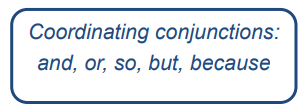Worksheet Solutions: Conjunction - 1 | English Grammar for Junior Classes - Class 1 PDF Download
Q1: Choose the correct conjunction to complete each sentence:
(i) I like pizza __________ pasta.
a) and
b) but
c) or
d) because
Ans: a) and
The word "and" is used to connect two similar things or ideas. In this sentence, both pizza and pasta are being mentioned together as things the person likes. So, we use "and" to join them.
(ii) It was raining heavily, __________ we decided to stay inside.
a) and
b) but
c) so
d) if
Ans: c) so
The word "so" is used to show that one thing happens because of another. In this case, because it was raining heavily, the decision to stay inside was made. "So" connects the cause (rain) with the effect (staying inside).
(iii) You can have ice cream __________ you finish your vegetables.
a) and
b) or
c) because
d) when
Ans: d) when
The word "when" is used to show that something will happen after another thing. Here, you can have ice cream when you finish your vegetables. It tells you that the ice cream will come after you finish eating.
Q2: Choose the best word for each sentence and write it in the space.

(i) It is cold, _________ I wear my hat and my mitts. (and, so)
Ans: It is cold, so I wear my hat and my mitts.
(ii) I want cake, _________ I’m not allowed. (but, or)
Ans: I want cake, but I’m not allowed.
(iii) I would go, _________ it is too far. (so, but)
Ans: I would go, but it is too far.
(iv) I will finish my homework, _________then I can play video games. (and, but)
Ans: I will finish my homework, and then I can play video games.
(v) We washed the dishes, _________we put them away. (and, but)
Ans: We washed the dishes, and we put them away.
Q3: Join the following sentences to make one complete sentence without using and, but or so.
(i) Bart had to ask for some money for the coffee. He had finished all his money on the taxi.
Ans: Bart had to ask for some money for the coffee because he had finished all his money on the taxi.
(ii) The sun began to dip over the horizon. The birds started to chirp.
Ans: As soon as the sun began to dip over the horizon, the birds started to chirp.
(iii) Homer was the shortest person in the basketball team. He scored the maximum number of points in every game.
Ans: Despite being the shortest person in the basketball team, Homer scored the maximum number of points in every game.
(iv) Lisa continued to play. She felt pain in her right arm.
Ans: Lisa continued to play inspite of the pain she felt in her right arm.
(v) We have to wade through the flooded lane. Alternately, we have to take a long detour.
Ans: Either we have to wade through the flooded lane or take a long detour.
(vi) Joining the Indian army has a precondition. You have to live in India.
Ans: Joining the Indian army has a precondition which is, to live in India.
(vii) Bart has to complete his homework. He has to do this before going out to play.
Ans: Before going out to play, Bart has to complete his homework.
(viii) The Indian economy has become more capitalistic. India opened its economy in 1992.
Ans: The Indian economy has become more capitalistic since the opening of the economy in 1992.
(ix) The payment to the vendor was delayed. The invoices were not approved in time.
Ans: The payment to the vendor was delayed because the invoices were not approved in time.
(x) He prepared hard all through the year. He barely secured the pass marks in the exam.
Ans: Although he prepared hard all through the year, he barely secured the pass marks in the exam.
Q4: Fill in the blanks using suitable conjunctions:
(i) This is a small ________ interesting story.
Ans: This is a small but interesting story.
(ii) Manu and Anu help ________
Ans: Manu and Anu help each other.
(iii) ________ I was a child, I lived in Dubai.
Ans: When I was a child, I lived in Dubai.
(iv) Make hay ________. the sun shines.
Ans: Make hay while the sun shines.
(v) We will visit Paris ________ Rome during the summer.
Ans: We will visit Paris or Rome during the summer.
(vi) Let us wait here _______ the rain stops.
Ans: Let us wait here until the rain stops.
(vii) _______ he worked hard he failed.
Ans: Though he worked hard, he failed.
(viii) I regard my mother ________ my best friend.
Ans: I regard my mother as my best friend.
(ix) ________ I was suffering from fever I couldn’t attend the class.
Ans: As I was suffering from fever, I couldn't attend the class.
(x) My sister is not ________ intelligent ________ my brother.
Ans: My sister is not as intelligent as my brother.
|
18 videos|286 docs|31 tests
|
FAQs on Worksheet Solutions: Conjunction - 1 - English Grammar for Junior Classes - Class 1
| 1. What is a conjunction and how is it used in English grammar? |  |
| 2. What are some common examples of conjunctions in sentences? |  |
| 3. How do coordinating and subordinating conjunctions differ? |  |
| 4. Can conjunctions be used at the beginning of a sentence? |  |
| 5. How can I improve my use of conjunctions in writing? |  |
















